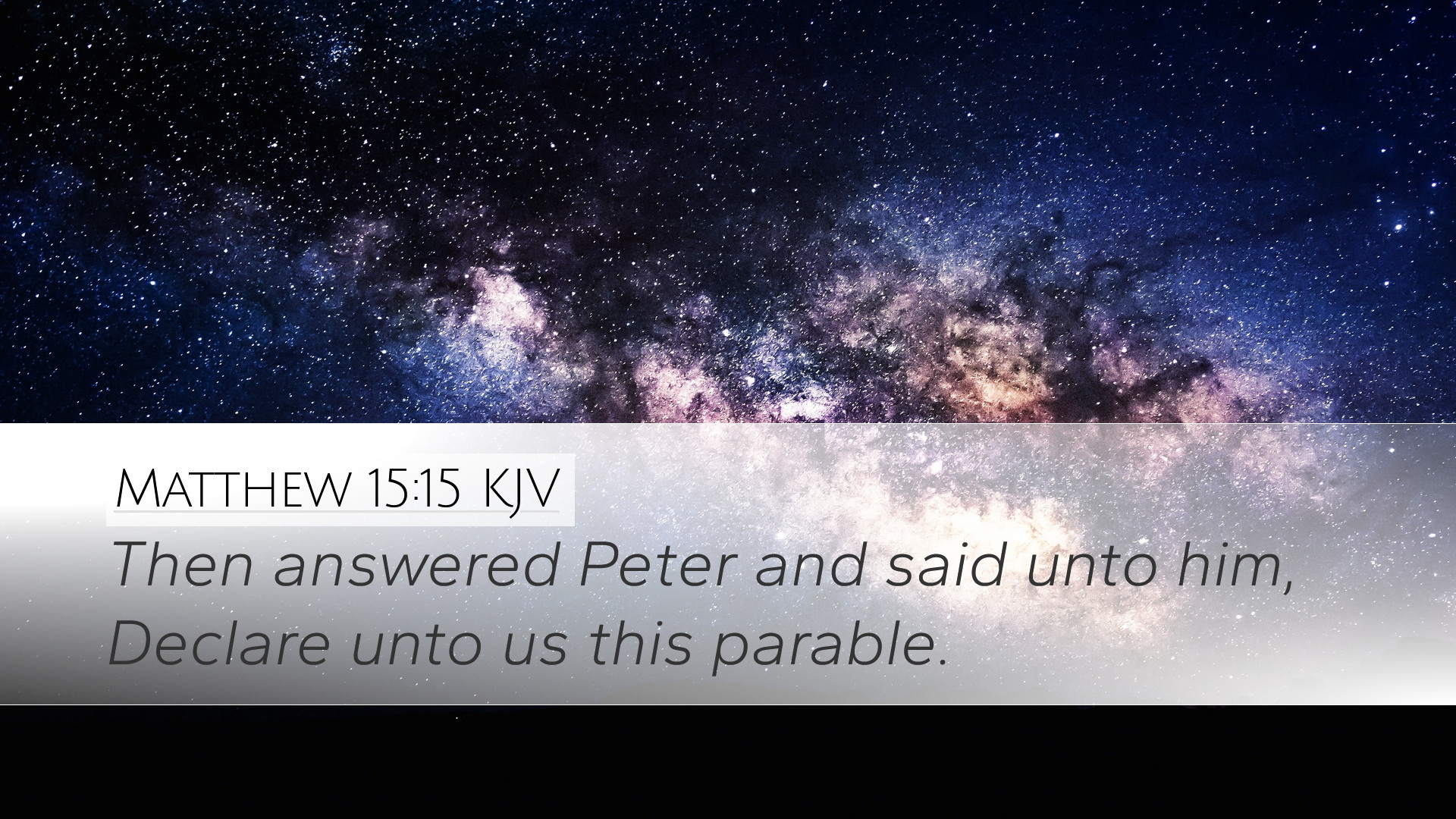Commentary on Matthew 15:15
Matthew 15:15 states, “Then answered Peter and said unto him, Declare unto us this parable.” This verse takes place during a significant teaching moment in Jesus’ ministry, following His discussion about the traditions of the elders and the distinction between man-made laws and the divine commandments.
Contextual Overview
This passage underscores a key theme in the Gospel of Matthew—the contrast between the spiritual understanding required for divine truths and the often limited perception of even His closest followers. Peter’s request for clarification calls attention to the depth of Christ’s teaching and the challenge of comprehending it fully.
Insights from Public Domain Commentaries
Matthew Henry's Commentary
Matthew Henry emphasizes the significance of Peter's inquiry, suggesting that it reflects a common struggle among the disciples to grasp Jesus’ parabolic teachings. He notes that Jesus often spoke in parables to reveal truths hidden from the wise and learned, while illustrating the responsive heart of those who seek understanding.
Henry elaborates on the nature of parables in scripture: they are vehicles for communicating deeper spiritual truths disguised within relatable earthly stories. Jesus' parables served not only to provoke thought but also to challenge listeners to reflect on their spiritual condition.
Albert Barnes' Commentary
Albert Barnes expands upon the idea that Peter’s request was indicative of the disciples’ desire for clarity. He notes that Peter was often seen as the spokesperson for the group, and his question exemplified a sincere yearning to comprehend the complexities of Jesus' message. Barnes highlights that Jesus often directly addressed the crowd with parables, leaving the explanations for intimate discussions with His disciples.
Furthermore, Barnes explains that this moment illustrates the broader theme of the necessity of divine revelation for understanding spiritual truths. He insists that the mysteries of God's kingdom can only be understood through the illumination of the Holy Spirit, indicating a reliance on divine wisdom over human intellect.
Adam Clarke's Commentary
Adam Clarke provides an exposition of the term "parable," noting that it derives from the idea of comparison and suggestion, pointing out similarities and moral lessons embedded within stories. Clarke points out that Peter’s request stemmed from a heart attuned to the necessity of learning, demonstrating a humble acknowledgment of their need for enlightenment.
Clarke also reflects on the role of discipleship, suggesting that it often involves the journey from confusion to clarity. He encourages the faithful to emulate Peter's desire to delve deeper into God's Word, deeming it necessary for spiritual growth and maturity.
Theological Implications
Matthew 15:15 serves as a reminder of the relational aspect of discipleship wherein questions are welcomed and exploring doubts leads to deeper faith. This verse invites us to examine several theological implications:
- The Nature of Discipleship: True discipleship involves both instruction and inquiry. As seen in Peter’s question, there is a dynamic relationship between teaching and seeking understanding that characterizes the life of a follower of Christ.
- Understanding through Revelation: The capacity to understand spiritual truths is not merely an intellectual exercise; it is a revelation imparted by God. This emphasizes the importance of prayer and reliance on the Holy Spirit for the comprehension of scripture.
- Humility in Learning: Peter’s approach exemplifies the attitude of humility. His willingness to ask for clarification models a healthy approach to theological inquiry, reminding believers to maintain a posture of teachability.
- The Role of Community: Through communal discussion of Christ’s teachings, believers are better positioned to grow in their understanding of scripture. This verse resonates with the importance of fellowship in spiritual development.
Conclusion
In summary, Matthew 15:15 not only captures a moment of clarity-seeking by Peter but also presents a profound opportunity for reflection on the nature of understanding within the context of faith. The insights drawn from public domain commentaries shed light on various dimensions of this verse, urging pastors, theologians, and students of the Word to embrace both the inquiry for understanding and the reliance upon divine illumination.
This verse serves as a call to engage deeply with scripture, encouraging a commitment to both study and supplication in the journey of faith.


